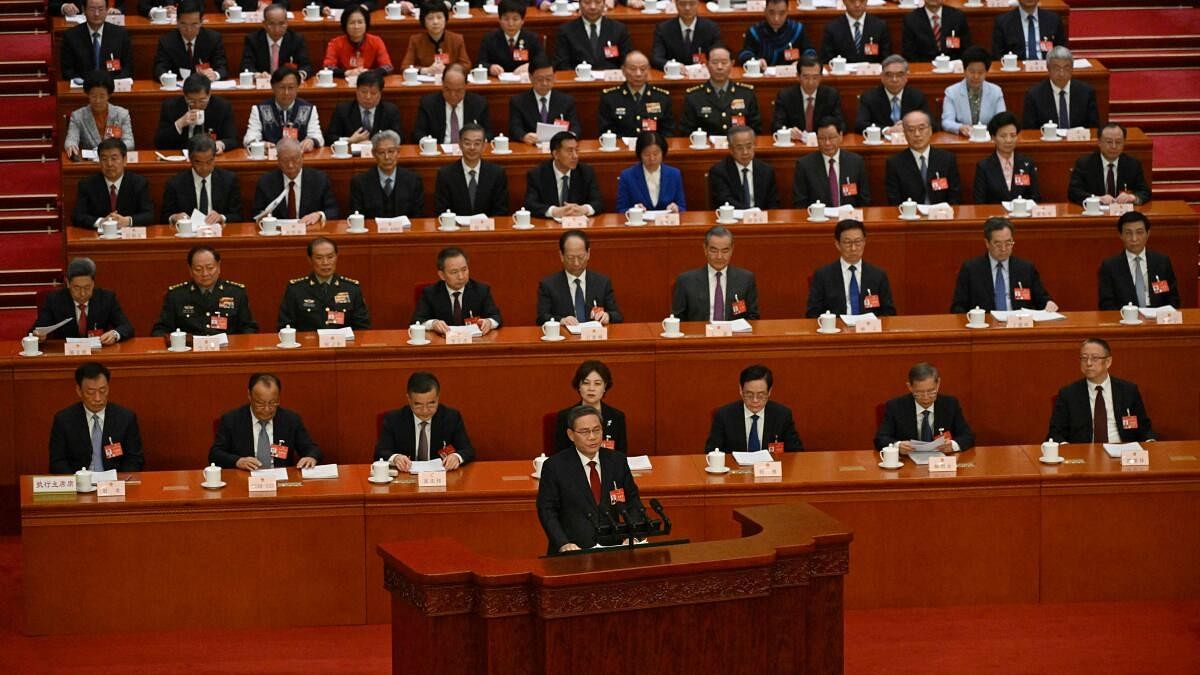
Chinese Premier Li Qiang delivers the work report at the opening session of the National People's Congress (NPC) at the Great Hall of the People in Beijing, China.
Credit: Reuters Photo
The 14th National People’s Congress (NPC) of the Chinese government began on March 5, and will end on March 11. This is also called the ‘two sessions’ where China’s top legislative body and advisory body meet. The NPC is the annual gathering, and is the platform where the Chinese government unveils its policies and plans for the upcoming year.
Premier Li Qiang presented his first annual report under the strong shadow of geopolitical challenges and a slowdown plaguing the Chinese economy. The annual report is crucial to understand Beijing’s focus for the coming year.
As per the 2024 annual report presented by Li, the growth target for 2025 for the $18 trillion economy is expected to be ~5 per cent. No set number has been announced, indicating the uncertainty that shadows Chinese economic recovery. Li also announced that the government wants to control inflation at ~3 per cent, while it also targets to create 12 million jobs and keep the unemployment rate to 5.5 per cent.
The report did discuss the external environment as one of the major hurdles in the path of Chinese economic recovery. It highlighted that “globally, the economic recovery was sluggish. Geopolitical conflicts became more acute, protectionism and unilateralism were on the rise, and the external environment exerted a more adverse impact on China’s development”. However, there has been a break from the norm this year as for the first time since 1993 the Premier is not scheduled to hold an independent press conference at the end of the NPC. The scrapping of the press conference underscores the limited role assigned to Li by Xi Jinping, and further strengthens the notion of the latter’s absolute control. Oh yes, Li praised Xi throughout his speech.
Prior to the NPC, there was talk and hope around the idea that Beijing may announce a major stimulus package to help the weakening economy. No such announcement happened. Li highlighted the major requirements for managing the economic slowdown by asserting that there is a need for “transforming the growth model, making structural adjustments, improving quality, and enhancing performance” but added that it will “not be easy” to undertake. Such statements make it clear that Beijing understands that economic recovery and fast-paced growth will not happen without an overall transformation of the economic model.
To boost economic growth, Xi has been pushing for people to increase domestic consumption. According to Xinhua, Xi recently asserted that it was important to “promote a new round of large-scale equipment renewals and trade-ins of consumer goods”. Xi hopes that domestic consumption would be enough to provide the much-needed boost to the slowing economy. However, such calls have not helped.
Moving away from economics, the Chinese defence budget has been set at $231 billion, which is 7.2 per cent higher than 2023. As per Chinese media reports, the single-digit rise in the defence budget is in tune with the Chinese agenda of maintaining peace and stability. Discussing the defence budget with the Global Times, Chinese military expert Zhang Junshe said, “Western media often misinterpret and smear China's defense budget, and these hypes are of double standards and bear malicious intentions”. Such statements are directed towards underplaying the Chinese military modernisation.
In addition, the Chinese government has set a budget of $51.5 billion for science and technology. The boost is in congruence with the ongoing challenges which Beijing is facing in developing the chip and semiconductor industry. Beijing has been investing heavily in the hope of developing the technology, with no major progress yet.
The NPC report underscores the challenges which the Chinese government is facing and that all is not fine. The scrapping of the press conference has given rise to speculations about the further tightening of control by Xi Jinping and the peaceful change of leadership. The annual report also put a lot of emphasis on ‘stability’ indicating that Beijing is worried about the growing unrest and uneasiness among the people as well as the global environment.
The declining population and the lacklustre success of the dual-circulation policy are an indication that what China needs to bounce back is a major shift in the growth model. The old model has reached its limit, and Xi’s tight-handed approach is not helping.
(Gunjan Singh is Assistant Professor, OP Jindal Global University.)
Disclaimer: The views expressed above are the author's own. They do not necessarily reflect the views of DH.